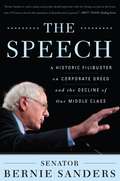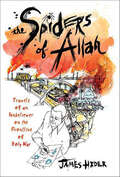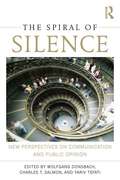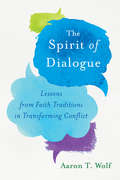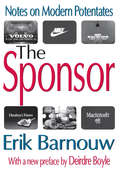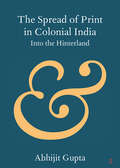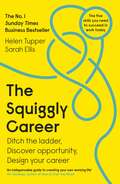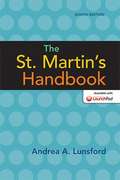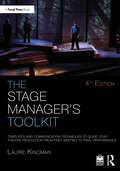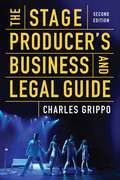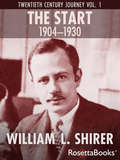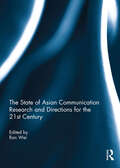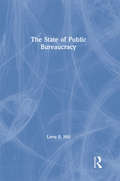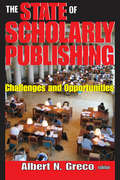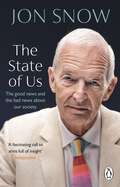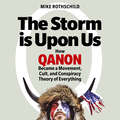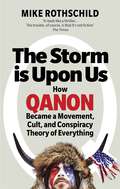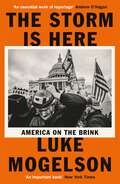- Table View
- List View
The Speech
by Bernie SandersIn the wake of President Obama's deal with congressional Republicans to preserve Bush-era tax cuts--tax cuts that gave colossal breaks to the wealthiest Americans--Senator Bernie Sanders, the independent senator from Vermont, publicly denounced the deal as an "absolute disaster" and decided to do something about it. On Friday, December 10, 2010, Senator Sanders galvanized millions of Americans with an eight-and-a-half-hour filibuster decrying the tax deal and all it symbolized: the bankrupting of the middle class, corporate greed, and the impotence and corruption of today's Congress. As Nation editor Katrina vanden Heuvel noted, "The good Senator from Vermont spoke for millions of struggling working and middle class people who feel their voices aren't being heard in a system dominated by well-funded lobbyists and corporate insiders. " Reprinted in its entirety and with a new introduction, The Speech is a People's State of the Union address, an anatomy of working and middle-class America rarely heard in the rarefied walls of the Senate.
The Speech and Language Protocol: An Assessment Tool for Early Years
by Stephanie LoPrestiThis valuable book addresses the common problems faced by speech‑language pathologists, offering solutions and strategies for more effective service delivery.Stephanie LoPresti introduces ‘The Protocol,’ a child development‑based approach that merges principles from developmental psychology and speech‑language pathology. The book covers a wide range of speech and language issues, including receptive, expressive, pragmatic, feeding, and play development, making it a versatile resource for clinicians. It is designed to be easy to use, with movable elements that adapt to a child’s progress from short‑ to long‑term milestones and goals. It emphasizes the concept of the zone of proximal development, ensuring that clinicians work with clients just above their current level of functioning, leading to meaningful progress.Accompanied by downloadable worksheets to assess progress, it will be an essential resource for all speech and language pathologists, particularly those working with young children. It will also be useful to students and educators in the field of speech‑language pathology seeking evidence‑based strategies for working with clients, as well as healthcare professionals, researchers, and educators interested in child development and language acquisition.
The Spiders of Allah: Travels of an Unbeliever on the Frontline of Holy War
by James HiderIn his fascinating, terrifying and often very funny book, James Hider takes his doubts about religious beliefs straight into the dark heart of the world's holy wars—from Israel to Gaza to Iraq—the birthplace that spawned so many faiths—and then back to Jerusalem. From hardcore Zionist settlers still fighting ancient Biblical battles in the hills of the West Bank to Shiite death squads roaming the lawless streets of Iraq in the aftermath of Saddam; whether it's the misappropriation and martyrdom of Mickey Mouse by Gaza's Islamists, or a US president acting on God's orders, Hider sees the hallucinatory effect of what he calls the 'crack cocaine of fanatical fundamentalism' all around him. As he meets terrorists, suicide bombers, soldiers, ayatollahs, clerics, and ordinary and extraordinary people alike, the question that sparked his journey continues to plague his thoughts: how can people not only believe in this madness, but die and kill for it too? This extraordinary and timely book takes the God Delusion debate onto the streets of the Middle East. It casts an unflinching yet compassionate eye on the very worst and most violent crimes committed in the name of religion, and then sharply asks the questions the world needs to answer if we are ever to stand a chance of facing our own worst demons.
The Spiral of Silence: New Perspectives on Communication and Public Opinion
by Wolfgang Donsbach Charles T. Salmon Yariv TsfatiSince its original articulation in the early 1970s, the 'spiral of silence' theory has become one of the most studied theories of communication and public opinion. It has been tested in varied sociopolitical contexts, with different issues and across communication systems around the world. Attracting the interest of scholars from communication, political science, sociology, public opinion and psychology, it has become both the subject of tempestuous academic debate as well as a mainstay in courses on communication theory globally. Reflecting substantial new thinking, this collection provides a comprehensive examination of the spiral of silence theory, offering a synthesis of prior research as well as a solid platform for future study. It addresses various ideological and methodological criticisms of the theory, links the theory with allied areas of scholarship, and provides analyses of empirical tests. Contributors join together to present a breadth of disciplinary and international perspectives. As a distinctive and innovative examination of this influential theory, this volume serves as a key resource for future research and scholarship in communicaiton, public opinion, and political science.
The Spirit Catches You and You Fall Down: a Hmong child, her American doctors, and the collision of two cultures
by Anne FadimanWhen three-month-old Lia Lee Arrived at the county hospital emergency room in Merced, California, a chain of events was set in motion from which neither she nor her parents nor her doctors would ever recover. Lia's parents, Foua and Nao Kao, were part of a large Hmong community in Merced, refugees from the CIA-run "Quiet War" in Laos. The Hmong, traditionally a close-knit and fiercely people, have been less amenable to assimilation than most immigrants, adhering steadfastly to the rituals and beliefs of their ancestors. Lia's pediatricians, Neil Ernst and his wife, Peggy Philip, cleaved just as strongly to another tradition: that of Western medicine. When Lia Lee entered the American medical system, diagnosed as an epileptic, her story became a tragic case history of cultural miscommunication.<P> Parents and doctors both wanted the best for Lia, but their ideas about the causes of her illness and its treatment could hardly have been more different. The Hmong see illness aand healing as spiritual matters linked to virtually everything in the universe, while medical community marks a division between body and soul, and concerns itself almost exclusively with the former. Lia's doctors ascribed her seizures to the misfiring of her cerebral neurons; her parents called her illness, qaug dab peg--the spirit catches you and you fall down--and ascribed it to the wandering of her soul. The doctors prescribed anticonvulsants; her parents preferred animal sacrifices. Winner of the National Book Critics Circle Award for Nonfiction.
The Spirit of Dialogue: Lessons from Faith Traditions in Transforming Conflict
by Aaron T. WolfWe tend to approach conflict from the perspective of competing interests. A farmer's interest lies in preserving water for crops, while an environmentalist's interest is in using that same water for instream habitats. It's hard to see how these interests intersect. But what if there was a different way to understand each party's needs?Aaron T. Wolf has spent his career mediating such conflicts, both in the U.S. and around the world. He quickly learned that in negotiations, people are not automatons, programed to defend their positions, but are driven by a complicated set of dynamics—from how comfortable (or uncomfortable) the meeting room is to their deepest senses of self. What approach or system of understanding could possibly untangle all these complexities? Wolf's answer may be surprising to Westerners who are accustomed to separating religion from science, rationality from spirituality.Wolf draws lessons from a diversity of faith traditions to transform conflict. True listening, as practiced by Buddhist monks, as opposed to the "active listening” advocated by many mediators, can be the key to calming a colleague's anger. Alignment with an energy beyond oneself, what Christians would call grace, can change self-righteousness into community concern. Shifting the discussion from one about interests to one about common values—both farmers and environmentalists share the value of love of place—can be the starting point for real dialogue.As a scientist, Wolf engages religion not for the purpose of dogma but for the practical process of transformation. Whether atheist or fundamentalist, Muslim or Jewish, Quaker or Hindu, any reader involved in difficult dialogue will find concrete steps towards a meeting of souls.
The Sponsor: Notes on Modern Potentates
by Roscoe PoundThe television sponsor has become semi-mythical. He is remote and unseen, but omnipresent. Dramas, football games, and press conferences pause for a ""word"" from him. He ""makes possible"" concerts and public affairs broadcasts. His ""underwriting grants"" brings the viewer music festivals and classic films. Interviews with visiting statesmen are interrupted for him, to continue ""in a moment.""Sponsorship is basic to American television. Even noncommercial television looks to it for survival. A vast industry has grown up around the needs and wishes of sponsors. Television's program formulas, business practices, and ratings have all evolved in ways to satisfy sponsor requirements. Indeed, he has become a potentate of our time.The Sponsor is divided into three parts. In ""Rise,"" Barnouw sketches the rise of the sponsor, in both radio and television, to his present state of eminence. In ""Domain,"" the sponsor's pervasive impact on television programming is examined, with an emphasis on network television, the primary arena of the industry. And in ""Prospect,"" Barnouw assesses what such dominance has meant for American society, mores, and institutions--and what it may mean for our future. This is a gripping volume about power, how it not only influences programming itself, but how it defines for the average person what is good, great, and desirable.
The Sports Writing Handbook (Routledge Communication Series)
by Thomas FenschCompletely revised and updated in a second edition, this volume represents the only book ever written that analyzes sports writing and presents it as "exceptional" writing. Other books discuss sports writers as "beat reporters" in one area of journalism, whereas this book shows aspiring sports writers a myriad of techniques to make their writing stand out. It takes the reader through the entire process of sports writing: observation, interviewing techniques, and various structures of articles; types of "leads;" transitions within an article; types of endings; use of statistics; do's and don'ts of sports writing; and many other style and technique points. This text provides over 100 examples of leads drawn from newspapers and magazines throughout the country, and also offers up-to-date examples of sports jargon from virtually every major and minor sport played in the U.S.
The Spread of Print in Colonial India: Into the Hinterland (Elements in Publishing and Book Culture)
by Abhijit GuptaThis study focuses on the spread of print in colonial India towards the middle and end of the nineteenth century. Till the first half of the century, much of the print production in the subcontinent emanated from presidency cities such as Calcutta, Bombay and Madras, along with centres of missionary production such as Serampore. But with the growing socialization of print and the entry of local entrepreneurs into the field, print began to spread from the metropole to the provinces, from large cities to mofussil towns. This Element will look at this phenomenon in eastern India, and survey how printing spread from Calcutta to centres such as Hooghly-Chinsurah, Murshidabad, Burdwan, Rangpur etc. The study will particularly consider the rise of periodicals and newspapers in the mofussil, and asses their contribution to a nascent public sphere.
The Spy Who Loved Us
by Thomas A. BassPham Xuan An was a brilliant journalist and an even better spy. A friend to all the legendary reporters who covered the Vietnam War, he was an invaluable source of news and a font of wisdom on all things Vietnamese. At the same time, he was a masterful double agent. An inspired shape-shifter who kept his cover in place until the day he died, Pham Xuan An ranks as one of the preeminent spies of the twentieth century. When Thomas A. Bass set out to write the story of An's remarkable career for The New Yorker, fresh revelations arrived daily during their freewheeling conversations, which began in 1992. But a good spy is always at work, and it was not until An's death in 2006 that Bass was able to lift the veil from his carefully guarded story to offer up this fascinating portrait of a hidden life. A masterful history that reads like a John le Carré thriller, The Spy Who Loved Us offers a vivid portrait of journalists and spies at war.
The Squiggly Career: The No.1 Sunday Times Business Bestseller - Ditch the Ladder, Discover Opportunity, Design Your Career
by Sarah Ellis Helen TupperTHE NO.1 SUNDAY TIMES BUSINESS BESTSELLER'The Squiggly Career is about navigating work in a way that suits you, it's a timely and brilliant handbook for now' Stylist 'A brilliant guide. Read it and get the tools you need to thrive in your career now and in the future' Marie Forleo, author of Everything is Figureoutable 'Logical, practical and based on tried and tested models' Financial Times's Book of the Month Career ladders and jobs for life are a thing of the past Today, we're living in a world of squiggly careers, where moving frequently and fluidly between roles, industries, locations, and even careers, is becoming the new normal. Squiggly careers can feel stressful and overwhelming, but if you know how to make the most of them, they can be full of opportunity, freedom and purpose. And to make the most of our increasingly squiggly careers we need to answer some important questions: What am I good at? What do I stand for? What motivates and drives me? Where do I want to go in the future? In The Squiggly Career, you'll learn how to: - Play to your super strengths - Discover your values - Overcome your confidence gremlins - Build better support networks - Explore your future possibilities Packed with insights about the changing shape of work and inspiration from highly successful people, this book will fuel your growth and help you be happier, and ultimately more successful in your career.
The St. Martin's Handbook 8th Edition
by Andrea A. LunsfordAndrea Lunsford’s comprehensive advice in The St. Martin’s Handbook, Eighth Edition, supports students as they move from informal, social writing to both effective academic writing and to writing that can change the world.
The St. Martins Guide to Public Speaking
by Douglas M. Fraleigh Joseph S. TumanThis succinct guide offers practical coverage of the material typically covered in a full-sized text - from invention, research, and organization to practice and delivery - in a concise, perfect for any setting across the curriculum, on the job, or in the community.
The Stage Manager's Toolkit: Templates and Communication Techniques to Guide Your Theatre Production from First Meeting to Final Performance (The Focal Press Toolkit Series)
by Laurie KincmanThe Stage Manager’s Toolkit, Fourth Edition, provides a comprehensive account of the role of the stage manager for live theatre with a focus on both written and verbal communication best practices.The book outlines the duties of the stage manager and assistant stage manager throughout a production, discussing not only what to do but why. It also identifies communication objectives for each phase of production, paperwork to be created, and the necessary questions to be answered to ensure success. This fourth edition includes: a new chapter devoted to documenting movement which includes both intimacy choreography and stage combat; updated and expanded information on using technology and social media; expanded information on the digital prompt book and other digital and web-based tools; updated paperwork examples; more information on Equity practices for the student and early career stage managers. Written for the stage management student and early career stage manager, this book is a perfect addition to any university Stage Management course.A companion website hosts customizable paperwork templates, instructional videos, links to additional information, teacher tools for individual chapters, and a bonus section on teaching stage management. To access these resources, visit www.routledge.com/cw/kincman.
The Stage Producer's Business and Legal Guide (Second Edition)
by Charles GrippoExpert, Practical Advice for Everyone in Show Business Now updated and expanded, this second edition of The Stage Producer’s Business and Legal Guide is the ultimate survival kit for anyone presenting live entertainment. The information contained in this handbook is essential for those working in Broadway, regional, stock, or university theater; concert halls; opera houses; and more. Attorney, producer, and playwright Charles Grippo provides comprehensive advice on every aspect of the theater business and the law, including: Crowdfunding Your ProductionNew Opportunities to Raise MoneySelf-ProductionLicensing and Producing PlaysDevised Theater and CollaborationsCreating Jukebox MusicalsOrganizing a Theater CompanyTheatrical InsuranceMaintaining a Harassment-Free EnvironmentNegotiating ContractsEssential Rules Every Board Member Must KnowManaging a Not-for-Profit Theater CompanyNavigating TaxesUsing Third-Party Intellectual PropertyAnd much, much more! The entire range of individuals involved in entertainment—producers, performers, writers, directors, managers, and theater owners—will find invaluable practical and legal advice in this handy guide.
The Start, 1904–1930 (Twentieth Century Journey #1)
by William L. ShirerThe former CBS foreign correspondent provides an invaluable look back at his life—and the events that forged the twentieth century. A renowned journalist and author of The Rise and Fall of the Third Reich, William L. Shirer chronicles his own life story—in a personal history that parallels the greater historical events for which he served as a witness. In the first of a three-volume series, Shirer tells of his early life, growing up in Cedar Rapids, and later serving as a new reporter in Paris. In this surprisingly intimate account, Shirer details his youthful challenges, setbacks, rebellions, and insights into the world around him. He offers personal accounts of his friendships with notable people including Isadora Duncan, Ernest Hemingway, and Sinclair Lewis. This fascinating personal account also provides an illuminating look into a lost pre-World War II era—and is notable as much for its historical value as for its autobiographical detail. Ideal for anyone fascinated by this period in history.
The State of Affairs: Explorations in infidelity and Commitment (LEA's Series on Personal Relationships)
by Jean Duncombe, Kaeren Harrison, Graham Allan and Dennis MarsdenThis volume brings together contributions on the study of sexual affairs in committed personal relationships. The editors enlisted colleagues with varied theoretical and methodological perspectives from Britain, the United States, and other countries. Together, their contributions provide a broad, cross-national perspective on affairs. Grounded in theoretical discussion, the chapters in this book introduce data collected by a broad range of methods, including attitude surveys, large statistical cohort studies, case studies, depth interviews, and group discussions. A number of contributors locate the theoretical discussion of affairs within the broader contemporary ordering of committed relationships, contrasting the liberating and empowering aspects of affairs with the damage they may inflict on society as a whole and on the lives of individuals and families. The themes of passion, transgression, secrecy, lies, betrayal, and gossip are common to a range of chapters throughout. The volume provides broad literature reviews and theoretical discussions concerning particular aspects of affairs, such as communication and jealousy. In addition, case studies are used for the more detailed exploration of heterosexual affairs and contemporary developments in gay male and lesbian relationships. The State of Affairs will be of interest to researchers, scholars, and students in social psychology; communication; sociology; family, social, and clinical psychology; and for practitioners in couple counseling.
The State of Asian Communication Research and Directions for the 21st Century
by Ran WeiThe 21st century has been called ‘the Asian Century’ by Eastern and Western academics, largely due to the economic and cultural rise of China and India. This volume explores both what this means for communication research, and the implications of Asia’s rising global power for communication scholars in Asia and from around the world. Hot topics and emerging trends are explored, encapsulating the new opportunities as well as the challenges for Asian communication scholars. Asia represents diverse cultural, economic, social and political systems that shape different media systems in various countries with fertile contexts for communication research. The scope of the chapters in this book includes mass communications, mobile technology, intercultural and political communication, news and entertainment, health communication, public relations, and comparative analyses of mainstream mass communication theories. The articles in this book were originally published in the Asian Journal of Communication.
The State of Public Bureaucracy (Bureaucracies, Public Administration, And Public Policy Ser.)
by Larry B. HillThe authors explore the many ways that gender and communication intersect and affect each other. Every chapter encourages a consideration of how gender attitudes and practices, past and current, influence personal notions of what it means not only to be female and male, but feminine and masculine. The second edition of this student friendly and accessible text is filled with contemporary examples, activities, and exercises to help students put theoretical concepts into practice.
The State of Scholarly Publishing: Challenges and Opportunities
by Harold LaskiFor decades, university presses and other scholarly and professional publishers in the United States played a pivotal role in the transmission of scholarly knowledge. Their books and journals became the "gold standard" in many academic fields for tenure, promotion, and merit pay. Their basic business model was successful, since this diverse collection of presses had a unique value proposition. They dominated the scholarly publishing field with preeminent sales in three major markets or channels of distribution: libraries and institutions; college and graduate school adoptions; and general readers (i.e., sales to general retailers).Yet this insulated world changed abruptly in the late 1990s. What happened? This book contains a superb series of articles originally published in The Journal of Scholarly Publishing, by some of the best experts on scholarly communication in the western hemisphere, Europe, Asia, and Africa. These authors analyze in depth the diverse and exciting challenges and opportunities scholars, universities, and publishers face in what is a period of unusual turbulence in scholarly publishing.The topics given attention include: copyrights, the transformation of scholarly publishing from a print format to a digital one, open access, scholarly publishing in emerging nations, problems confronting journals, and information on how certain academic disciplines are coping with the transformation of scholarly publishing. This book is a must read for anyone interested in the scholarly publishing industry's past, its current focus, or future plans and developments.
The State of Us: The good news and the bad news about our society
by Jon Snow'A fascinating call to arms full of insight' IndependentAfter four decades broadcasting to the nation each night, Jon Snow gives vent to his opinions on the state of our nation . . . the good news and the bad newsIt is rare in history that so many nations in the developed world are in crisis at the same time. There has been a disintegration of trust in political leaders and in the media that holds them to account. For all the progress humankind has made, for all the inventions and new technologies, our society is being undermined by inequality. To fix it, we must begin by seeking out the truth about our world.In The State of Us, Jon Snow traces how the life of the nation has changed across his five-decade career, from getting thrown out of university for protesting apartheid to interviewing every prime minister since Margaret Thatcher.In doing so, he shows how the greatest problems at home and abroad so often come down to inequality and an unwillingness to confront it. But that is not our fate. Despite the challenges, Snow has witnessed profound social progress. In this passionate rallying cry, he argues that at its best, journalism reflects not just who we are now, but who we can be.We've had enough of division; the future is for us.
The Stationers' Company and the Printers of London, 1501-1557
by Peter W. M. BlayneyThis major, revisionist reference work explains for the first time how the Stationers Company acquired both a charter and a nationwide monopoly of printing. In the most detailed and comprehensive investigation of the London book trade in any period, Peter Blayney systematically documents the story from 1501, when printing first established permanent roots inside the City boundaries, until the Stationers' Company was incorporated by royal charter in 1557. Having exhaustively re-examined original sources and scoured numerous archives unexplored by others in the field, Blayney radically revises accepted beliefs about such matters as the scale of native production versus importation, privileges and patents, and the regulation of printing by the Church, Crown, and City. His persistent focus on individuals - most notably the families, rivals, and successors of Richard Pynson, John Rastell, and Robert Redman - keeps this study firmly grounded in the vivid lives and careers of early Tudor Londoners.
The Storm Is Upon Us: How QAnon Became a Movement, Cult, and Conspiracy Theory of Everything
by Mike Rothschild***"An ideal tour guide for your journey into the depths of the rabbit hole that is QAnon, and even shows you a glimmer of light at the exit." - Cullen Hoback, director of HBO's Q: Into the StormIn 2017, President Trump made a cryptic remark at a gathering of military officials, describing it as 'the calm before the storm'-then refused to explain himself to puzzled journalists. But on internet message boards, a mysterious poster called 'Q Clearance Patriot' began an elaboration all of their own.Q's wild yarn hinted at a vast conspiracy that satisfied the deepest desires of MAGA-America. None of Q's predictions came to pass. But did that stop people from clinging to every word, expanding Q's mythology, and promoting it ever more widely? No.Conspiracy culture expert Mike Rothschild is uniquely equipped to explain QAnon, from the cults that first fed into it, to its embrace by Trump and the right-wing media. With families torn apart and with the Capitol under attack, he argues that mocking the madness of QAnon will get us nowhere. Instead, he argues that QAnon tells us everything we need to know about global fear after Trump-and that we need to understand it now, because it's not going away.(p) 2021 Octopus Publishing Group
The Storm Is Upon Us: How QAnon Became a Movement, Cult, and Conspiracy Theory of Everything
by Mike Rothschild*****'A chilling overview of a movement that should arguably have no place in any healthy, well-educated society.' - The Telegraph'A compelling book.' - The Guardian'The Storm Is Upon Us is an impressive piece of research and a gripping read. Rothschild's book reads like a thriller, with cliffhangers that leave you eager for the next episode. The trouble, of course, is that it's not fiction.' - The Times'An ideal tour guide for your journey into the depths of the rabbit hole that is QAnon, and even shows you a glimmer of light at the exit.' - Cullen Hoback, director of HBO's Q: Into the StormIn 2017, President Trump made a cryptic remark at a gathering of military officials, describing it as 'the calm before the storm'-then refused to explain himself to puzzled journalists. But on internet message boards, a mysterious poster called 'Q Clearance Patriot' began an elaboration all of their own.Q's wild yarn hinted at a vast conspiracy that satisfied the deepest desires of MAGA-America. None of Q's predictions came to pass. But did that stop people from clinging to every word, expanding Q's mythology, and promoting it ever more widely? No.Conspiracy culture expert Mike Rothschild is uniquely equipped to explain QAnon, from the cults that first fed into it, to its embrace by Trump and the right-wing media. With families torn apart and with the Capitol under attack, he argues that mocking the madness of QAnon will get us nowhere. Instead, he argues that QAnon tells us everything we need to know about global fear after Trump-and that we need to understand it now, because it's not going away.
The Storm is Here: America on the Brink
by Luke MogelsonThe New Yorker's award-winning war correspondent returns to his own country to chronicle a story of mounting civic breakdown and violent disorder, in a vivid eyewitness narrative of revelatory explanatory power.'This is a searing book, exquisitely reported, lyrically told, and so vivid it will make your heart stop-a dark journey into what ails America' Patrick Radden KeefeOn the morning of January 6, a gallows was erected on the National Mall in Washington, D.C. A little after noon, as thousands of Trump supporters marched past the structure, some paused to climb its wooden steps and take pictures of the US Capitol framed within an oval noose. Up ahead, the dull thud of stun grenades could be heard, accompanied by bright flashes. Several people carried Confederate flags. Others had Tasers, baseball bats, bear spray, and truncheons. 'They need help!' a man shouted. 'It's us versus the cops!' No one seemed surprised by what was taking place. There was an eerie sense of inexorability, mixed with nervous hesitation. It reminded me of combat: the slightly shocked, almost bashful moment when bravado, fantasy, and training crash against reality.In early 2020, Luke Mogelson, who had been living in France and covering the Global War on Terrorism, returned home to report on the social discord that the pandemic was bringing to the fore in the US. Soon, he found himself embedded with militias descending on the Michigan state capitol. From there, the story swept him on to Minneapolis, then to Portland, and ultimately to Washington, D.C. His stories for The New Yorker were hailed as essential first drafts of history. They were just the tip of the iceberg.The Storm Is Here is the definitive eyewitness account of how--during a season of sickness, economic uncertainty, and violence--a large segment of Americans became convinced that they needed to rise up against dark forces plotting to take their country away from them, and then did just that. It builds month by month, through vivid depictions of events on the ground, from the onset of the pandemic to the attack on the US Capitol--during which Mogelson was in the Senate chamber with the insurrectionists--and its aftermath. Bravely reported and beautifully written, Mogelson's book follows the tradition of some of the essential chronicles of war and unrest of our time.
